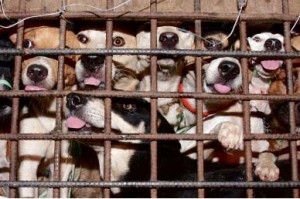Dog meat trade flourishing, says watchdog
For many Filipinos, dogs are not their best friend but a favorite food.
Thus the illegal trade in dog meat continues to thrive with some 290,000 canines butchered for food each year, the Criminal Investigation and Detection Group (CIDG) of the Philippine National Police said Tuesday, on the heels of a successful operation against dog butchers in Pangasinan.
Two dogs were given a new lease on life after they were rescued by CIDG operatives—along with the London-based animal rights group Animal Kingdom Foundation Inc.—from a slaughterhouse in San Carlos City.
The authorities shut down the illegal “abattoir” in Bonifacio village and arrested two men caught cleaning the carcasses of three dogs, the CIDG said in a statement.
Trading in dog meat has been illegal in the Philippines since 1998 under the Animal Welfare Act which states that no animals other than cattle, pigs, goats, sheep, poultry, rabbits, carabaos, horses, deer and crocodiles may be killed for food, unless it’s part of a religious ritual or when an animal is considered a danger to others or to control the animal population.
Article continues after this advertisementViolators face six months to two years in prison and a fine of at least P1,000.
Article continues after this advertisementThe CIDG said the figure of 290,000 dogs slaughtered each year came from Linis Gobyerno Inc., a nongovernment watchdog.
On its website, Linis Gobyerno estimates the dog meat trade to be worth P174 million a year. It says the trade enjoys the “support and patronage of local officials,” which makes it difficult for law enforcers to arrest those engaged in it.
“In Baguio City and La Trinidad, Benguet, alone, there are around 60 restaurants, eateries and canteens that serve dog meat. These are found all over the city, including the central business district, and are patronized by no less than local politicians, heads of government offices, policemen and even professionals,” it said.
In the CIDG operation on Monday, the law enforcers saved two dogs that were tied up in a makeshift cage, said Senior Superintendent Ferdinand O. Divina, CIDG Region I chief.
“The suspects, Danny E. Samira and Jansen C. Tagaduar, were caught red-handed in the act of cleaning the butchered dogs,” Divina said.
Last week, CIDG Director Samuel Pagdilao Jr. met with Glyn Ford, a former member of the European Parliament and an executive director of consultancy firm Polint, who called for the stringent enforcement of the law protecting dogs.
Pagdilao said he had ordered all CIDG regional heads to strictly enforce the law against the dog meat trade.
He also said consumers risked contracting rabies and other diseases when they ate dog meat.
